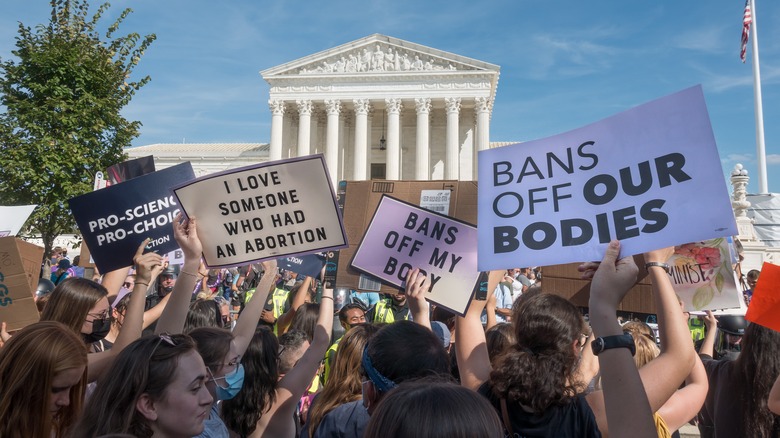Loretta Lynn's Most Controversial Song Is Still As Relevant As Ever
Loretta Lynn was one of country music's most legendary stars ever to hit the stage, but one of her songs stirred up lots of controversies back in the 1970s. Now, 50 years later, it eerily reminds us of our political world. The song was called "The Pill," which was written in 1975 about an argument between a husband and a wife about the wife going on the birth control pill. The song was intended to support married women who didn't want to have kids or have more children, which got the song banned on 60 country radio stations, according to Taste of Country.
Lynn explained the message of the song, saying (via People), "It's just a wife arguin' with her husband. The wife is sayin', 'You've kept me barefoot and pregnant all these years while you've been slippin' around. Now you straighten out or I'll start, now that I have the pill.'" Nonetheless, "The Pill" turned out to be one of Lynn's greatest successes before she passed away on October 4, 2022 (via Taste of Country).
History of The Pill
The birth control pill had a controversial start when it was first created in the early 1950s. After researchers Gregory Pincus and Dr. John Rock tested the hormone progesterone on patients and found that it was able to "pause" ovulation for a period of time, they began making what would be known as "the pill," which was simply what the general public called the new birth control pill. Many states had strict laws on conducting human trials when it came to birth control, including Massachusetts, which is where Pincus and Rock were from. Thus the two had to disguise their research under infertility research (via PBS).
The first oral contraceptive pill Rock and Pincus devised was called Enovid, and it was approved by the Food and Drug Administration in 1960, which caused an uproar of controversy among religious and socially conservative groups (via Time). However, in a famous Supreme Court case — Griswold v. Connecticut — the court ruled that any laws prohibiting people from obtaining the birth control pill violated an implied right to privacy in the Constitution, which was also used as a precedent for the monumental Roe v. Wade case in 1973 (via The First Amendment Encyclopedia).
The Overturning of Roe v. Wade
In the year 2022, there is still as much controversy surrounding reproductive rights as there was 50 years ago, thus making "The Pill" just as important to the national discussion as it was back then. On June 24, 2022, Roe v. Wade — the Supreme Court case in 1973 that established women have the right to privacy concerning the case of abortion — was overturned by the conservative super-majority with a 6-3 vote. As a result, many states have put laws into effect that ban abortion in their states, which has caused many legal cases to break out, abortion clinics to shut down, and an overwhelming of clinics in states where abortion remains legal (via Forbes).
As of September 23, 2022, 14 states have completely banned abortion, whereas one state has banned abortions after six weeks, according to The New York Times. However, other states, like Indiana, have had abortion bans revoked after courts have found them to violate their state constitutions (via Forbes). In the middle of September of 2022, Lindsey Graham, a Republican senator from South Carolina, introduced legislation that would enforce a nationwide abortion ban after 15 weeks, according to the Center for American Progress. Given the longevity of the debate surrounding women's reproductive rights, Loretta Lynn's "The Pill" serves as a powerful message that can still be applied to today's generation.


